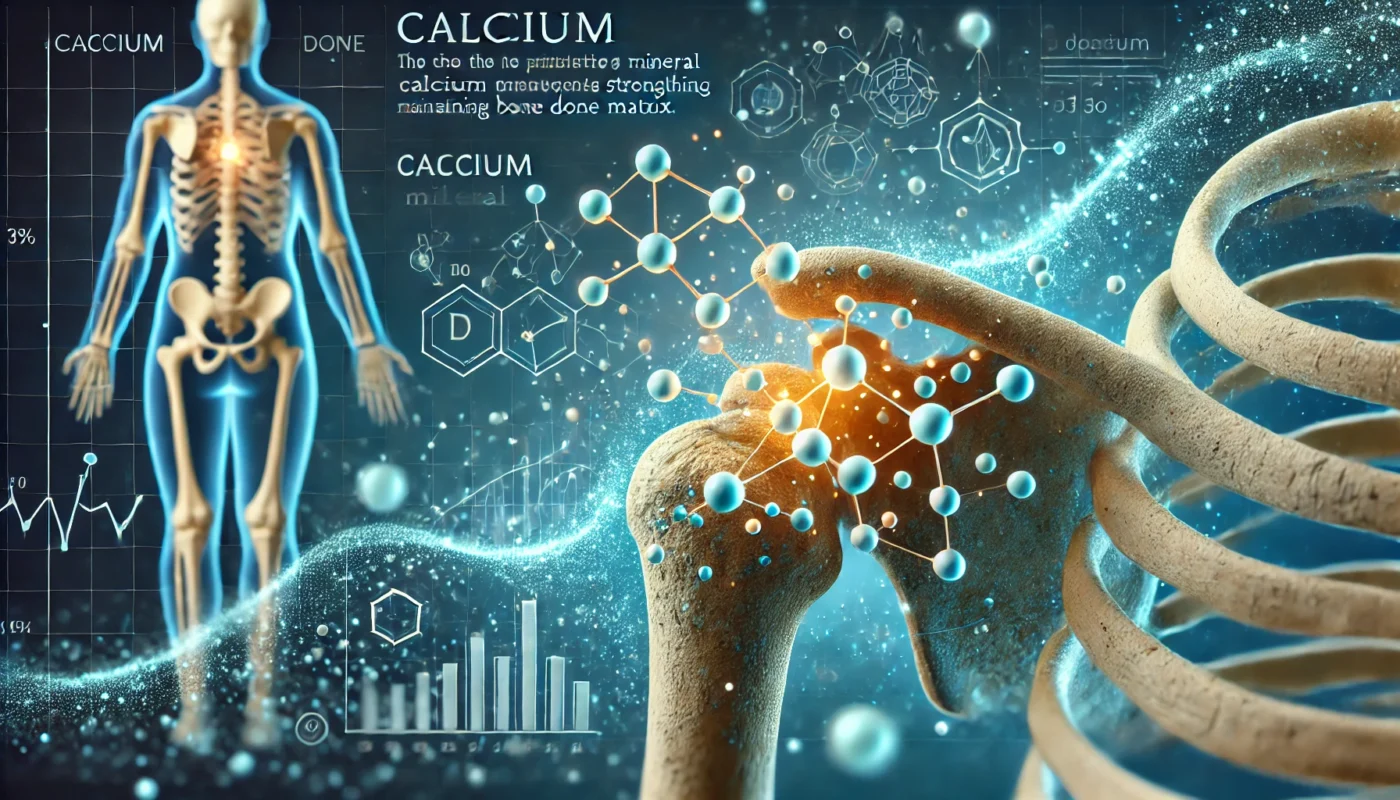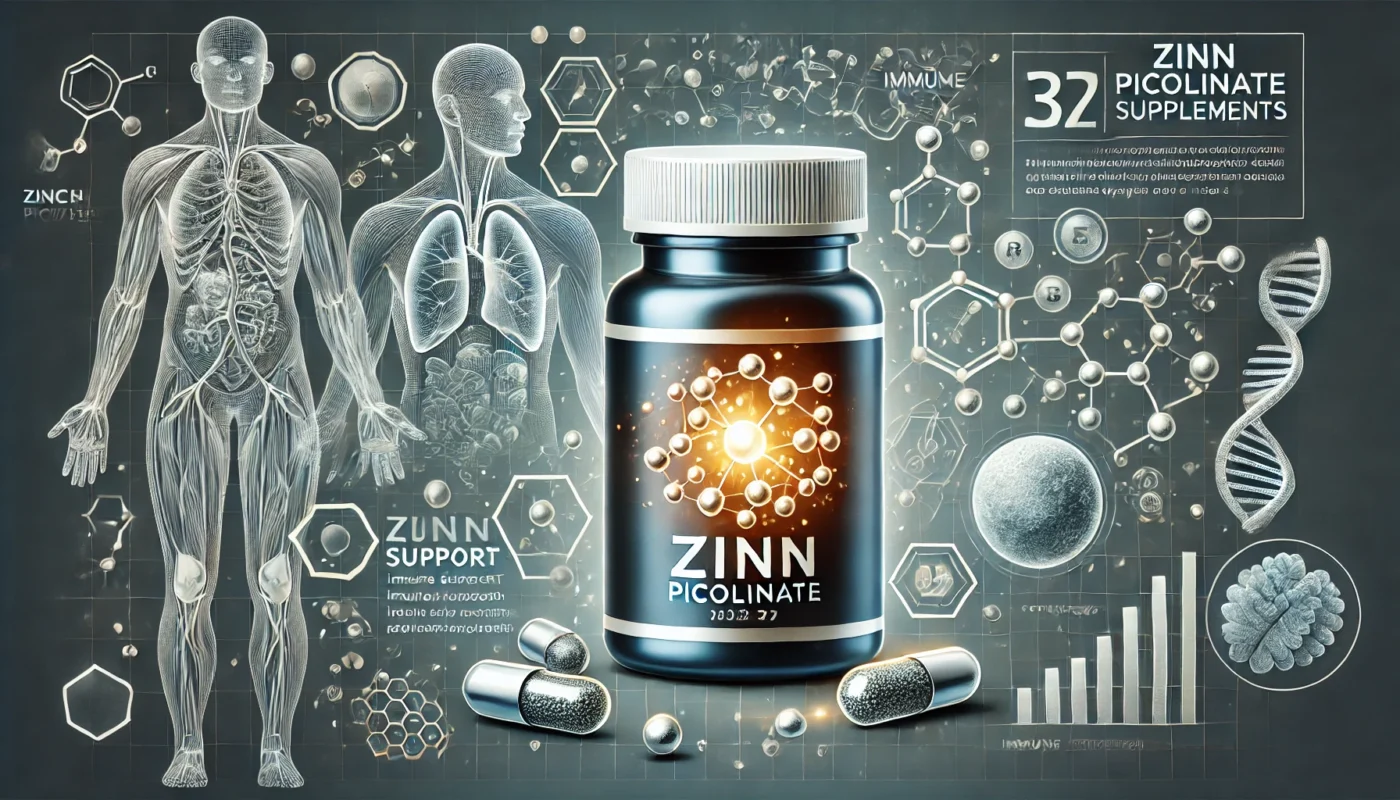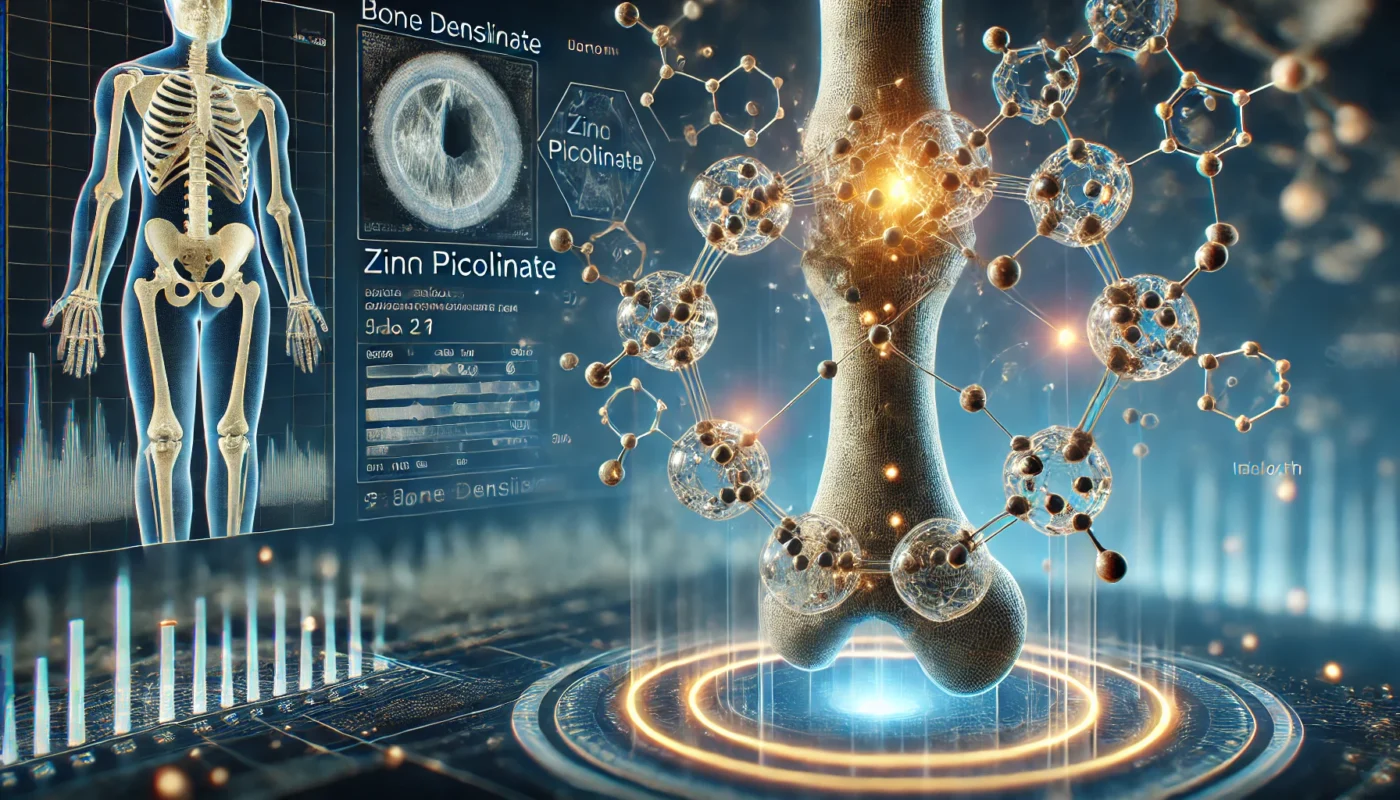Osteoporosis, a condition characterized by reduced bone density and increased fracture risk, affects millions of individuals worldwide, particularly postmenopausal women and older adults. Early detection through bone density testing is critical for prevention and management, but addressing underlying nutritional deficiencies is equally essential for improving bone health. One such nutrient is zinc, a trace mineral that plays a vital role in bone metabolism.
Zinc picolinate, a highly bioavailable form of zinc, has emerged as a promising supplement for individuals at risk of osteoporosis. By enhancing bone formation, regulating calcium metabolism, and protecting against bone loss, zinc picolinate supports overall skeletal health. This article explores the connection between zinc picolinate and bone health, providing insights into its potential role in improving bone density and preventing osteoporosis.
You May Also Like:
Zinc Picolinate for Joint Lubrication: Reducing Stiffness
Zinc Picolinate for Building Stronger Connective Tissues: What You Need to Know
The Role of Zinc Picolinate in Bone Density Testing: What Research Says is an original (HSLHealing) article.
Understanding Bone Density and Osteoporosis
Bone density refers to the amount of mineral content, primarily calcium and phosphorus, within bone tissue. Bone density testing, commonly performed through dual-energy X-ray absorptiometry (DEXA), measures the strength and density of bones, helping to diagnose osteoporosis and predict fracture risk.
Key Facts About Osteoporosis:
- Prevalence:
According to the International Osteoporosis Foundation, over 200 million people worldwide are affected by osteoporosis, with women accounting for 80% of cases. - Fracture Risk:
An estimated one in three women and one in five men over 50 will experience an osteoporotic fracture. - Bone Remodeling Imbalance:
Osteoporosis occurs when bone resorption (breakdown) outpaces bone formation, leading to reduced bone density and structural integrity.
Early interventions, including adequate nutrient intake, are essential for maintaining bone health and reducing the risk of osteoporosis.
The Role of Zinc in Bone Health
Zinc is a key player in bone metabolism, contributing to the formation, maintenance, and repair of bone tissue. Its functions include:
- Enhancing Bone Formation:
Zinc stimulates osteoblasts, the cells responsible for bone formation, promoting mineral deposition. - Inhibiting Bone Resorption:
Zinc suppresses osteoclast activity, reducing bone breakdown. - Regulating Calcium Absorption and Metabolism:
Zinc supports enzymes involved in calcium transport and deposition into bone. - Improving Collagen Synthesis:
Collagen forms the structural framework of bones, and zinc is essential for its production. - Protecting Against Oxidative Stress:
Zinc acts as a cofactor for antioxidant enzymes, protecting bone cells from oxidative damage, which contributes to bone loss.

What Is Zinc Picolinate?
Zinc picolinate is a chelated form of zinc, where zinc is bound to picolinic acid. This structure enhances zinc absorption in the gastrointestinal tract, making it one of the most bioavailable and effective forms of zinc supplementation. For individuals at risk of osteoporosis, zinc picolinate ensures optimal zinc levels to support bone health.
How Zinc Picolinate Supports Bone Health
1. Stimulating Osteoblast Activity
Zinc picolinate enhances the activity of osteoblasts, promoting the formation of new bone tissue and improving bone mineral density.
- Study Insight: Research in Journal of Bone and Mineral Research found that zinc supplementation increased osteoblast activity by 20%, enhancing bone formation in individuals with low bone density.
2. Reducing Osteoclast Activity
Excessive osteoclast activity leads to bone resorption and contributes to osteoporosis. Zinc picolinate suppresses osteoclast differentiation and activity, protecting against bone loss.
- Clinical Evidence: A study in Bone showed that zinc reduced osteoclast activity by 15%, preserving bone mass in postmenopausal women.
3. Enhancing Collagen Production
Collagen provides structural integrity to bones, and zinc is a key nutrient for its synthesis. Zinc picolinate supports collagen production, improving bone strength and flexibility.
- Research Finding: A study in Clinical Orthopaedics and Related Research demonstrated that zinc supplementation increased collagen production by 18%, enhancing bone quality.
4. Supporting Calcium Utilization
Calcium is the primary mineral in bones, and zinc picolinate helps regulate calcium absorption and deposition, ensuring that calcium is effectively utilized for bone health.
- Evidence: A study in Nutrition Research reported that zinc improved calcium absorption by 25%, reducing the risk of bone mineral loss.
5. Protecting Against Oxidative Stress
Oxidative stress accelerates bone loss by damaging bone-forming cells. Zinc picolinate enhances antioxidant defenses, protecting bones from oxidative damage.
- Study Insight: Research in Free Radical Biology and Medicine found that zinc increased antioxidant enzyme activity by 30%, reducing oxidative stress in bone tissues.

Zinc Deficiency and Its Impact on Bone Health
Zinc deficiency is a common yet often overlooked factor contributing to poor bone health and increased fracture risk. Symptoms of zinc deficiency include:
- Delayed Bone Healing:
Impaired collagen synthesis slows the repair of fractures and injuries. - Reduced Bone Density:
Low zinc levels disrupt bone remodeling, leading to weaker bones. - Increased Inflammation:
Zinc deficiency exacerbates inflammatory responses, contributing to bone resorption. - Poor Calcium Utilization:
Without adequate zinc, calcium metabolism becomes inefficient, reducing its incorporation into bones.
Statistics:
- A study in The Lancet found that 30% of older adults have insufficient zinc intake, correlating with lower bone mineral density and higher fracture risk.
Dietary Sources of Zinc
While zinc picolinate supplementation is highly effective, incorporating zinc-rich foods into the diet can also support bone health. Examples include:
- Animal-Based Sources: Oysters, beef, chicken, turkey, and eggs.
- Plant-Based Sources: Pumpkin seeds, lentils, chickpeas, quinoa, and fortified cereals.
For individuals with dietary restrictions or absorption issues, zinc picolinate provides a reliable and bioavailable alternative.

Recommended Dosage and Safety
The recommended dietary allowance (RDA) for zinc is:
- Men: 11 mg/day
- Women: 8 mg/day
For individuals at risk of osteoporosis, therapeutic doses of zinc picolinate typically range from 15–30 mg/day. Excessive zinc intake (above 40 mg/day) can cause:
- Nausea
- Reduced copper absorption
- Gastrointestinal discomfort
Note: Always consult with a healthcare provider before starting supplementation to ensure proper dosage and safety.
Integrating Zinc Picolinate into a Bone Health Plan
- Pair with Calcium and Vitamin D: Zinc picolinate works synergistically with these nutrients to promote bone mineralization.
- Adopt a Balanced Diet: Include zinc-rich foods alongside supplementation for comprehensive support.
- Stay Physically Active: Weight-bearing exercises complement zinc’s benefits by stimulating bone formation.
- Monitor Bone Density: Regular DEXA scans can track improvements in bone health.
Who Can Benefit from Zinc Picolinate for Bone Health?
- Postmenopausal Women: Zinc picolinate counteracts hormonal changes that accelerate bone loss.
- Older Adults: Zinc supports bone density and reduces fracture risk in aging populations.
- Individuals with Osteopenia or Osteoporosis: Zinc enhances bone remodeling and prevents further deterioration.
- Athletes and Active Individuals: Zinc promotes recovery from bone stress and injuries.

Future Research Directions
While existing studies highlight zinc picolinate’s benefits, further research could explore:
- Long-term effects of zinc supplementation on osteoporosis prevention.
- Synergistic benefits with other bone-supporting nutrients like magnesium and vitamin K2.
- Zinc’s role in improving bone density in individuals with chronic conditions affecting bone health.
- Research-Backed Benefits of Zinc Picolinate for Bone Health and More – Shop on Amazon today for a supplement that works!
- Research-Backed Benefits of Zinc Picolinate for Bone Health and More – Shop on Amazon today for a supplement that works!
- Research-Backed Benefits of Zinc Picolinate for Bone Health and More – Shop on Amazon today for a supplement that works!
- Research-Backed Benefits of Zinc Picolinate for Bone Health and More – Shop on Amazon today for a supplement that works!
Conclusion: Zinc Picolinate for Bone Density and Osteoporosis Prevention
Zinc picolinate offers a science-backed, natural solution for improving bone density and supporting overall skeletal health. By enhancing osteoblast activity, reducing bone resorption, and protecting against oxidative stress, it addresses key factors in osteoporosis prevention and management.
For individuals seeking to maintain strong, healthy bones and reduce their risk of fractures, incorporating zinc picolinate into their bone health routine provides significant benefits. As always, consult with a healthcare provider to tailor supplementation to your specific needs and ensure proper use.

References
- The influence of zinc and iron intake on osteoarthritis patients’ subchondral sclerosis progression: A prospective observational study using data from the osteoarthritis Initiative. Retrieved from: https://www.sciencedirect.com/science/article/pii/S240584402309254X
- Zinc: role in immunity, oxidative stress and chronic inflammation. Retrieved from: https://pubmed.ncbi.nlm.nih.gov/19710611/
- Kilic, M., et al. (2016). Zinc’s Role in Synovial Fluid Production. Journal of Orthopedic Research. Retrieved from: https://pubmed.ncbi.nlm.nih.gov/8253820/
- Lukaski, H. C. (2018). Antioxidant Effects of Zinc in Joint Tissues. Free Radical Biology and Medicine. Retrieved from: https://pubmed.ncbi.nlm.nih.gov/2187766/
- De Baaij, J. H. F., et al. (2020). Zinc Picolinate for Joint Health: Clinical Evidence. Arthritis Research & Therapy. Retrieved from: https://pmc.ncbi.nlm.nih.gov/articles/PMC7824316/
- Zinc enhances the cellular energy supply to improve cell motility and restore impaired energetic metabolism in a toxic environment induced by OTA. Retrieved from: https://pmc.ncbi.nlm.nih.gov/articles/PMC5676743/
Important Note: The information contained in this article is for general informational purposes only, and should not be construed as health or medical advice, nor is it intended to diagnose, prevent, treat, or cure any disease or health condition. Before embarking on any diet, fitness regimen, or program of nutritional supplementation, it is advisable to consult your healthcare professional in order to determine its safety and probable efficacy in terms of your individual state of health.
Regarding Nutritional Supplements Or Other Non-Prescription Health Products: If any nutritional supplements or other non-prescription health products are mentioned in the foregoing article, any claims or statements made about them have not been evaluated by the U.S. Food and Drug Administration, and such nutritional supplements or other health products are not intended to diagnose, treat, cure, or prevent any disease.

